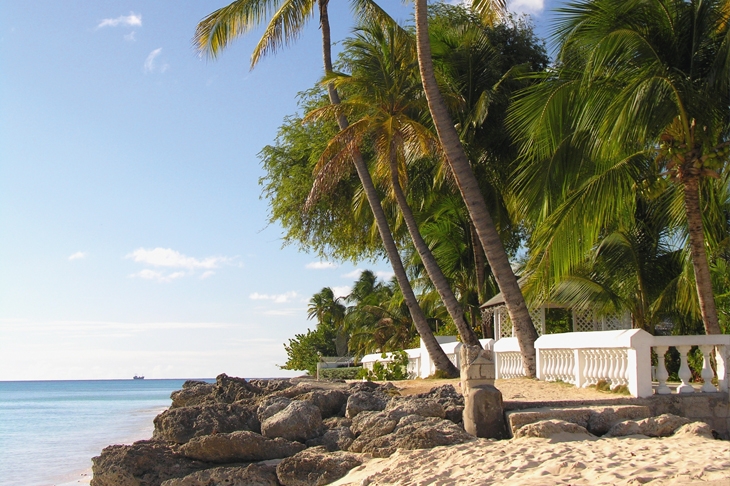Barbados
Homesick by nature, I like my foreign places to be exotic but also to remind me of home. Barbados, for types like us, is the ideal holiday destination. Sea so warm you can loll in it for hours on end, and the charm of dusty rum shacks on hot afternoons — but also cucumber sandwiches for tea, and Sunday Matins in Anglican parish churches where they sing Victorian hymns. The cucumber sandwiches were a daily treat at our English family-owned hotel Cobblers Cove on the west coast. Afternoon tea in the drawing room is on the house, and that is only one touch among 1,000 or so that make staying there bliss. Others include: the welcome from the staff who whisk your luggage away and lead you to the indoor-outdoor bar where a uniformed barman with a dazzling smile mixes you a rum or fruit punch; gorgeous suites, like small self-contained flats, with verandahs where you can set and gaze at the Caribbean Sea from your chaises longues; a constant supply of pink-and-white-striped swimming towels; and a different flavour of specially baked bread from the bread basket each evening as you sip your wine by the waves. The novelist Sam Angus, who does the interior design and makes a point of employing local craftsmen and women to make the wickerwork and ceramics, has an eye for beauty and a feeling for simple pleasures, comforts and good taste that tallies with my own, so I was happy and not homesick. I love luxury — who doesn’t? — but I don’t like being separated from the normal world. Cobblers Cove isn’t surrounded by miles and miles of golf courses or anything like that. Though it’s a mini-paradise of gardens and sea, it’s on a normal road in a normal place, with yellow buses trundling past, picking you up if you want a reggae ride into Bridgetown. A five-minute walk in one direction, and you’re in a cul-de-sac of village houses with local children cavorting on the pavements and jumping over walls; ten minutes in the other direction and you’re in the centre of Speightstown, with said rum shacks and said Anglican church. We took all three sons and each of them, with their different characters, was fulfilled and delighted. The eldest made such good friends with local Barbadians when he went to a rum shack for four hours one evening that he almost resolved to emigrate; the middle one was allowed to practise the organ in the church — Barbadians tend to say an enthusiastic ‘Yes’ if you request things; and the youngest basked in the pleasures of the moment: the bathing, the relaxing, the boat rides, the not having to think about school. The island is only 21 miles by 14, so how — I now wonder — did we manage to take an hour and a half to drive from Foul Bay in the south (a stunning empty bay with North-Cornwall-sized waves but warm sea) to the village towards the north where we stopped for a midday ice-cold drink? We did get a bit lost; and you do. I’ve since learned that Barbados, though small, is densely populated and has almost 1,000 miles of paved roads. You don’t go there to get away from humanity. You go there to celebrate humanity. I won’t forget that place where we had a drink in the middle of the day: a wooden shack-with-fridge where the family was sitting around doing (as my overworked lawyer husband noticed with envy) nothing. ‘Not even on their phones: just doing nothing.’ Old man asleep on a bench; young man talking to another young man in such strong Bajan accents that you could hardly understand a word they were saying; a mother and her little girl with plaited hair. We just sat there, doing nothing too, and drinking our Lipton Ice Tea, but feeling distinctly welcome. Did I mention the uniforms? Is it odd to like that? There was a lot of it about, reminding me of olden-days Britain. Clergy in cassocks; choir in mortarboards; freemasons in aprons; schoolchildren in yellow dresses; chefs in white jackets; and, best of all, the Royal Barbados Police Band in white short-sleeved shirts with epaulettes and tassels, the gentle conductor waving baton rather than truncheon on a Saturday night. Visiting the Franklyn Stephenson Cricket Academy was a thrill for husband and eldest son, who care about the West Indies cricket team and long for them to be as good as they were in the glory days of the 1980s. Franklyn Stephenson (widely regarded, I’ve been told, as the greatest cricketer never to play in a Test match) welcomed us; he feels the same, and is doing all he can to make it come true, training talented boys in the nets on weekday afternoons and arranging foreign tours for them. ‘Out of little villages like these,’ said my husband as we drove past another scattering of houses with verandahs, ‘came some of the greatest cricketers the world has ever known — sometimes three of them from the same village!’ He loved that. From May to July, hotel prices virtually halve. I’m trying to get to the bottom of the truth about the weather in those months. The only way to get to the truth is to be there for the whole summer (yes, please); but apparently you might get 20 minutes of rain every other day, and apart from that it’s the normal regime of hot, blue, sunny paradise. Apparently we British have got it into our heads that we shouldn’t go to the Caribbean in the summer and that’s wrong. Barbados needs us — and we need it.
Ysenda Maxtone Graham
Lazy bays
Ysenda Maxtone Graham on the lure of blue skies, powder-white beaches and total relaxation

issue 14 October 2017





Comments